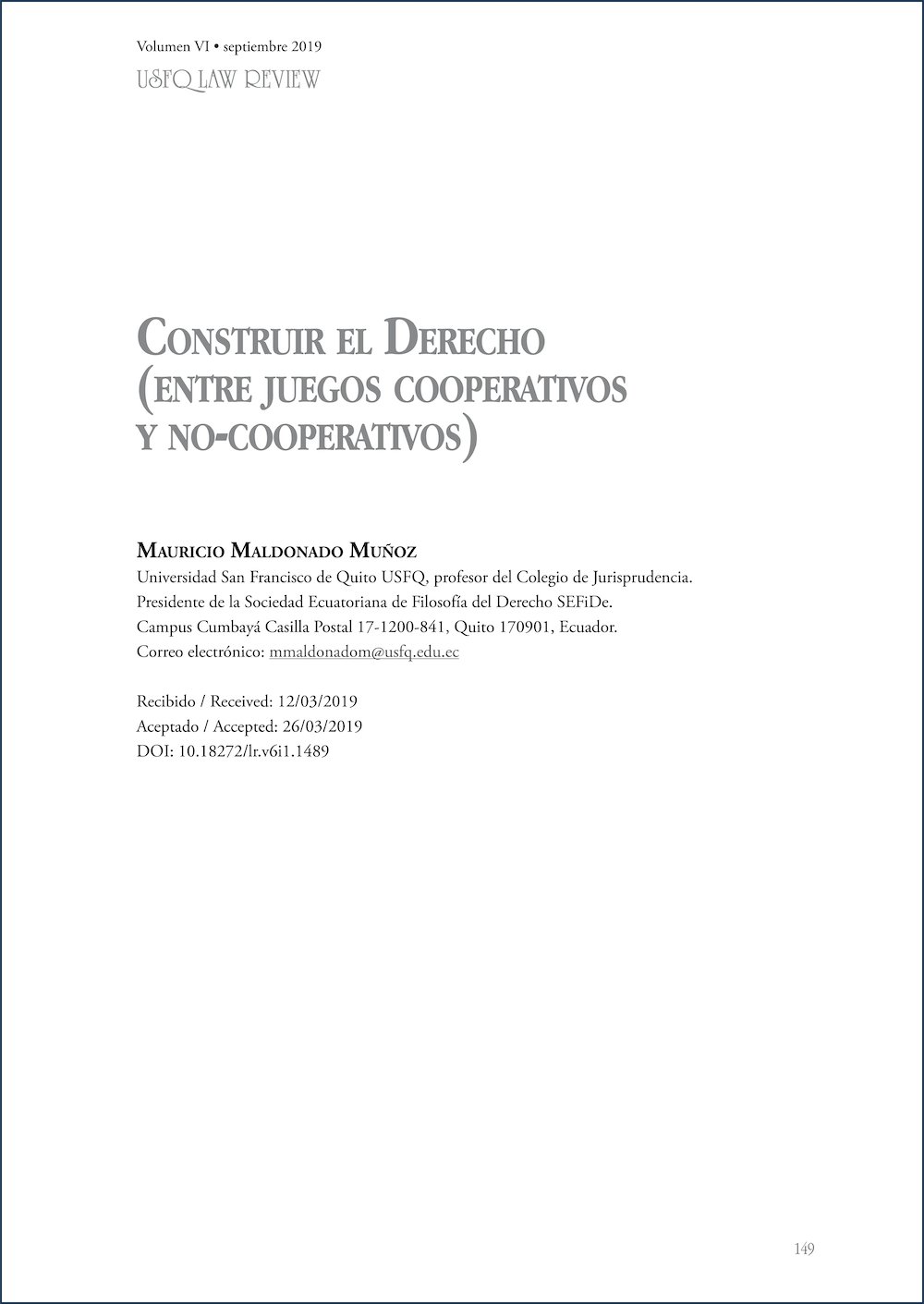Building the Law (between Cooperative and Non-Cooperative Games)
DOI:
https://doi.org/10.18272/lr.v6i1.1489Keywords:
Game Theory, cooperative games, nnon-cooperative games, legal conflictsAbstract
This essay seeks to explain the way in which the concepts of cooperative and non-cooperative game, within the framework of game theory, constitute a valuable tool to reconstruct-in a formal or structural sense-some of the legal conflicts that shape our modern legal systems, as well as the way in which such a thing happens.
Downloads
References
Bruno Celano. Derecho, justicia, razones. Madrid: Centro de Estudios Constitucionales, 2009.
Bruno Celano. Due problemi aperti della teoria dell"™interpretazione giuridica. Modena: Mucchi, 2017.
Bruno Verbeek. "Conventions and Moral Norms: the Legacy of Lewis". Topoi, 27/1-2 (2008).
Bruno Verbeek. Instrumental Rationality and Moral Philosophy: an essay on the virtues of cooperation. Dordrecht: Kluwer Academic Publishers, 2002.
David Lewis. Convention. A Philosophical Study. Cambridge: Harvard University Press, 1969).
Eduardo García de Enterría. La constitución como norma y el Tribunal Constitucional. Madrid: Civitas, 1982.
Giovanni Damele & Francesco Pallante. "Argomentazione, negoziazione e persuasione nei processi costituenti". RIFL (2016).
Hans Kelsen. General Theory of Law and The State. New Brunswick: Transaction Publishers, (1949) 2006.
John Nash. "Non-cooperative Games". Annals of Mathematics Journal, 54 (1951).
John Nash. "Two-Person Cooperative Games". Econometrica, 21 (1953).
Jon Elster. "Arguing and Bargaining in Two Constituent Assemblies". Journal of Constitutional Law, 2/2 (2000).
Jordi Ferrer Beltrán. "El error judicial y los desacuerdos irrecusables en el derecho". Acordes y desacuerdos. Cómo y por qué los juristas discrepan. Pau Luque Sánchez & G.B. Ratti (eds.). Madrid: Marcial Pons, 2012.
José Juan Moreso. "La doctrina Julia Roberts y los desacuerdos irrecusables". Los desacuerdos en el Derecho. José Juan Moreso, Jordi Ferrer-Beltrán & Luis Prieto Sanchís (eds.). Madrid: Fundación Coloquio Jurídico Europeo, 2010.
Joseph Raz. Entre la autoridad y la argumentación. Sobre la teoría del derecho y la razón práctica. Madrid: Marcial Pons, 2013.
Kelsen, Hans. La teoria generale del diritto e il materialismo storico. Roma: Istituto della Enciclopedia italiana, (1931) 1979.
Ken Binmore. La teoría de juegos. Madrid: Alianza editorial, 2007.
Luigi Ferrajoli. Principia iuris. Teoría del derecho y de la democracia. 1. Teoría del derecho. Madrid: Trotta, 2011.
Mauricio Maldonado Muñoz. "Dilemas morales, conflictos entre derechos y conflictos «por» y «en» el derecho". Discusiones, 19/1 (2017).
Norberto Bobbio. Dalla struttura alla funzione. Bari: Laterza, 2007.
Norberto Bobbio. Studi per una teoria generale del diritto. Torino: Giappichelli, 2012.
Paolo Comanducci. "La interpretación jurídica". El realismo jurídico genovés. Jordi Ferrer-Beltrán & Giovanni Battista Ratti (eds.). Madrid: Marcial Pons, 2011.
Pierluigi Chiassoni. Desencantos para abogados realistas. Bogotá: Universidad Externado de Colombia, 2012.
Pierluigi Chiassoni. Técnicas de interpretación jurídica. Breviario para juristas. Madrid: Marcial Pons, 2011.
Riccardo Guastini. "Conoscere il diritto". Quaderni di ricerca giuridica della Consulenza Legale, 75 (2014).
Riccardo Guastini. "Interpretación y construcción jurídica". Isonomía, 43 (2015).
Riccardo Guastini. Interpretare e argomentare. Milano: Giuffrè, 2011.
Riccardo Guastini. La sintaxis del derecho. Madrid: Marcial Pons, 2016.
Richard Braithwaite. Theory of Games as a Tool for the Moral Philosopher. Cambridge: Cambridge University Press, 1995.
Steven Kuhn. "Reflections on Ethics and Game Theory". Synthese, 141/1 (2004).
Umberto Eco. Los límites de la interpretación. Barcelona: Lumen, 1992.

Published
How to Cite
Issue
Section
License
In relation to copy rights, authors publishing with USFQ Law Review know and accept its internal policies, including but not limited to:
1. Open Access Policy.
2. Authorship Policy.
3. Copyright Policy.
4. Pre-Publication Policy.
5. Post-Publication Policy.
6. Intellectual Property Protection Policy.
7. Digital Preservation Policy.


